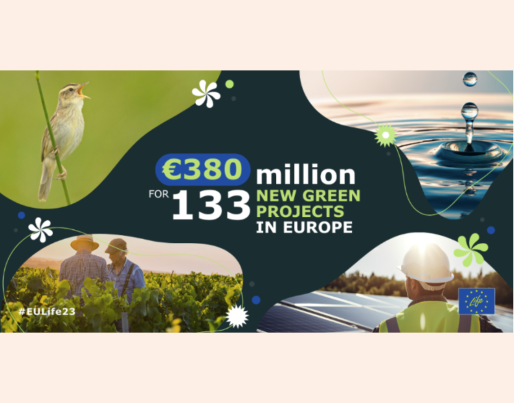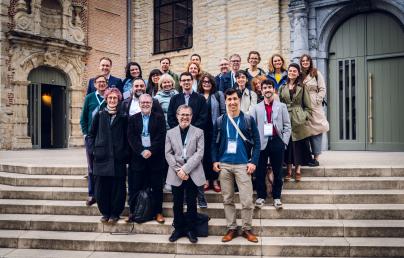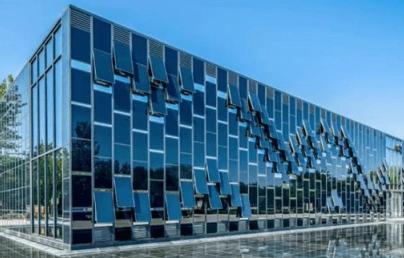
New LIFE for the built environment in the EU

New LIFE for the built environment in the EU
The LIFE Programme has allocated over EUR 380 million to 133 new green projects across Europe, many of which focus on making the building sector sustainable and inclusive. Below is a non-exhaustive list of these initiatives.
From building deep renovation to mainstream heat pumps’ adoption, from standardisation of Energy Performance Certificates to the proliferation of One Stop Shops: these are among the topics of several new LIFE projects supporting the decarbonisation and the efficiency improvement of the building sector. However, the LIFE Programme addresses a broad spectrum of environmental and climate action initiatives, with the building sector being just one of its focus areas.
133 new projects from all over Europe have been financed through the LIFE Programme for environment and climate action, which aims to contribute to achieving the broader goals of the Green Deal. These projects are divided into four main areas:
Conserving and restoring nature
Making better use of the environment and resources
Reducing greenhouse gas emissions and increasing climate resilience
Accelerating the clean energy transition
More than EUR 380 million has been allocated for these initiatives. This funding, provided by the Commission, represents more than half of the total EUR 574 million investment required, with the remainder coming from national, regional, and local governments, public-private partnerships, businesses, and civil society organisations.
In particular, EUR 105 million (including EUR 99 million in EU contributions) was allocated to the 'clean energy transition' (CET) area. Each area is further divided into 'topics,' and it is within these LIFE-CET topics that most of the projects aimed at making the building sector more sustainable are framed. The following is a non-exhaustive list of these topics and projects.
Topic BETTERRENO
Creating the conditions to make renovation faster, deeper, smarter, service-and data-driven:
openBEP4EU
OpenBEP4EU seeks to provide an open-source, universal software tool based on the ISO 52000 standards to standardise EPC calculations across EU Member States. By making building performance data accessible to stakeholders like financial institutions and energy providers, it supports the creation of financial products for sustainable renovations.
LIFE Reno Tides
The COVID crisis and the Ukraine war have heightened economic challenges like rising material costs, inflation, and interest rates, impacting the renovation market. To prevent stagnation in deep energy retrofits and support factories producing prefabricated facades or roofs, the project introduces a smartly designed, 3-staged Net Zero energy retrofit buy-in scheme involving multiple building owners, including social housing organizations.
BARRIO
BARRIO addresses fragmented renovation by aggregating demand at the neighbourhood level, developing business models, and implementing prefabricated solutions for deep decarbonisation. The Defragmentation Multidisciplinary Toolkit clusters buildings and stakeholders, mapping needs to prioritise large-scale renovation interventions.
GEAR-UP
The GEAR Framework allows a building's energy efficiency improvements to be metered and paid like renewable energy, with costs integrated into the service charge. Tenants maintain the same electricity costs but benefit from enhanced comfort, managed by an 'Energy Host' overseeing energy efficiency potential for up to 20 years.
ReLIFE
The EU building stock, responsible for over a third of EU energy-related emissions, is targeted by the Fit-for-55 package and the Renovation Wave to double renovation rates. ReLIFE will support deep building renovations by offering an open-source platform with data and services to guide decision-making, focusing on the residential sector and illustrating potential returns and risk reduction.
Topic POLICY
Towards an effective implementation of key legislation in the field of sustainable energy:
OBSERVE
OBSERVE aims to support six EU Member States (Croatia, Cyprus, France, Greece, Italy, and Spain) in developing national Building Stock Observatories by standardising data collection protocols, enhancing synergies with EU initiatives, and improving the transparency of building data. This effort will assist national authorities in implementing energy and climate policies, promoting better policy decisions on building energy efficiency and regulation compliance towards 2030.
INDICATE LIFE
INDICATE LIFE establishes the data and methodological foundations for national whole-life-carbon (WLC) development across Europe, supporting the construction sector's path to carbon neutrality by 2050. The project develops WLC benchmarks, provides guidance, and fosters collaboration among industry, academia, and policymakers to shape WLC regulations and policy recommendations at both national and EU levels.
GreenRenoV8
The EU's Renovation Wave strategy aims to double annual renovation rates by 2030, addressing both energy efficiency and seismic resilience in seismic-prone regions. GreenRenoV8 supports sustainable building renovation, focusing on reducing carbon emissions and addressing seismic vulnerability, energy efficiency, and lifecycle carbon impacts by 2050.
Topic BUILD UP Skills
Upskilling and reskilling interventions enabling a decarbonised building stock and energy system integration:
AchieVE-ZEB
The AchieVE-ZEB project aims to enhance sector knowledge and training for Zero Emission Buildings, aligning with the EU Green Deal's sustainability goals. By developing comprehensive training materials and methodologies, the consortium seeks to ensure long-term adoption and replication of high-quality training schemes for professionals in Austria and Germany.
DiVirtue
The DiVirtue project seeks to transform the construction industry in five countries by developing innovative digital training programmes, utilizing VR/AR technologies to enhance skills for deep energy renovations and zero-emission buildings. By addressing identified gaps in training and engaging educational institutions, the project aims to build capacity in the sector and support the EU's 2030 energy and climate objectives.
Construye 2030+
The project aims to enhance the construction sector's transition to sustainability by developing training resources and certification for green skills through on-site training. Key activities include a "Training Route" across 10 Spanish cities, a skills certification system, and education on new energy regulations, contributing to a competitive and energy-efficient economy in line with the EU's climate goals
BUSHROSSs
The Building Up Skills for Home Renovation One-Stop-Shops (BUSHROSSs) initiative aims to enhance the skills of stakeholders in establishing OSSs, facilitating efficient energy refurbishment and promoting well-being in communities.
Topic OSS
Integrated services for clean energy transition in buildings and businesses:
HABITAT
North Macedonia is aligning its 2030 climate and energy goals with the EU, enhancing building energy efficiency legislation but facing a low renovation rate of 1%, well below the EU's 5% target. The OSS HABITAT initiative aims to create integrated energy renovation services in three cities, targeting 200 housing units to facilitate investments of EUR 3 million and significant energy savings while addressing skills gaps and financing challenges.
OTTER LIFE
Demand for energy renovations from homeowners is rising due to high energy prices, but coordination among renovation players remains lacking, causing mistrust among individuals. The OTTER LIFE project aims to enhance the renovation process through a digital platform, LOUTRE, which offers financing solutions and strengthens advisory support, ultimately fostering trust and facilitating comprehensive renovations in targeted metropolitan areas.
Renov-AID
Renov-AID develops and implements an integrated One-Stop-Shop (OSS) concept for urban municipalities in Slovenia, focusing on enhancing the customer journey and expanding efficient renovation practices. The project aims to catalyse sustainable change across Slovenia, support climate neutrality goals, and improve living conditions by promoting innovative renovation models and facilitating knowledge exchange at the EU level.
FACILITA
Europe's inefficient building stock hampers the Clean Energy Transition, with public building renovations crucial for wider efforts. In Spain, the FACILITA project will establish One-Stop-Shops in Extremadura, Madrid, and Valencia to provide comprehensive support for local authorities, facilitating deep energy renovations and promoting climate neutrality by 2050.
RenoInGR
RenoInGR aims to create a One-Stop-Shop to support Greek municipalities in executing energy-efficient building renovations, focusing on islands and mountainous areas facing resource challenges. The project seeks to exceed nZEB standards, reduce CO2 emissions, and facilitate large-scale funding through integrated services and project bundling, with plans to renovate over 100 buildings and achieve significant energy savings and emissions reductions.
RENPOWER
RENPOWER aims to empower homeowners in Ireland and Spain to enhance energy efficiency and comfort through integrated home renovation services, with ECTC and GoiEner collaborating on training and knowledge sharing to adapt solutions to local needs. The project targets 200 housing units for renovation, focusing on sustainable materials and financing mechanisms, while producing a Replication Toolkit to help other EU regions implement similar services for a clean energy transition.
AIRE
The AIRE project aims to transform home renovation services in Mallorca and Tenerife by creating a private Integrated Home Renovation Service (IHRS) that provides personalised support and a quality certification label for accountability. With a vision for a replicable franchise model, AIRE seeks to empower homeowners across Spain with a seamless and high-quality renovation experience.
CROSSFIT
CROSSFIT seeks to revolutionise energy efficiency in public sector procurement by creating a one-stop shop in Greece, Portugal, and Spain, modelled after Belgium's successful example. This initiative aims to simplify procurement processes, attract private investment, and replicate successful models across Europe, ultimately facilitating a EUR 3 billion capital deployment and significant CO2 reductions.
FEPC
The EPC market in Poland faces challenges such as limited knowledge, high costs, and complex procedures, prompting the establishment of a one-stop shop EPC Facilitator to support stakeholders, enhance market capacity, and streamline project processes. The initiative will conduct studies, develop training, and create platforms for knowledge sharing, while assembling a pipeline of 100 potential projects to ensure long-term sustainability.
Topic HEAT PUMPS
Boosting heat pump deployment through alternative models and skilled installers:
install.res
The install.res project aims to boost demand for heat pumps in existing buildings by developing innovative, replicable delivery models that enhance energy efficiency and affordability. It will conduct demonstration projects across several European countries, focusing on scalability and performance, while ensuring a just heat transition for vulnerable households through collaboration with key stakeholders.
KnowHowHP
The KnowHowHP project aims to upskill installers and professionals to promote the use of heat pumps in existing multi-story buildings, aligning with EU climate goals. It features a training programme that combines knowledge-based software tools for effective planning and implementation of energy-efficient refurbishments, supported by a consortium of experienced partners.
SKILLSAFE-EU
The RePowerEU plan aims to install nearly 10 million heat pumps by 2027, increasing the use of low global warming potential refrigerants like R290 (Propane) while addressing safety concerns due to its flammability. The 'SKILLSAFE-EU' project will develop industry-wide guidelines for the safe handling and installation of these heat pumps, involving collaboration among manufacturers, associations, and training institutions.
HeatCraftHP
The HeatCraftHP project aims to tackle the shortage of over 500,000 skilled craftsmen in Europe’s heat pump sector by identifying essential skills, addressing gaps - particularly for women - and developing tailored upskilling programmes. By integrating workplace learning with practical applications and interactive tools, the initiative seeks to enhance the knowledge and performance of future workers, ultimately improving the reliability and effectiveness of heat pump systems across Europe.
Re-Energize
The Re-energize project addresses the EU's environmental challenges by revitalising the heat pump workforce through strategic capacity building, enhancing training for over 385 professionals and 115 trainers. It aims to increase public awareness and foster collaborations, ultimately reducing the skills gap in sustainable heating and cooling technologies and promoting energy efficiency.

